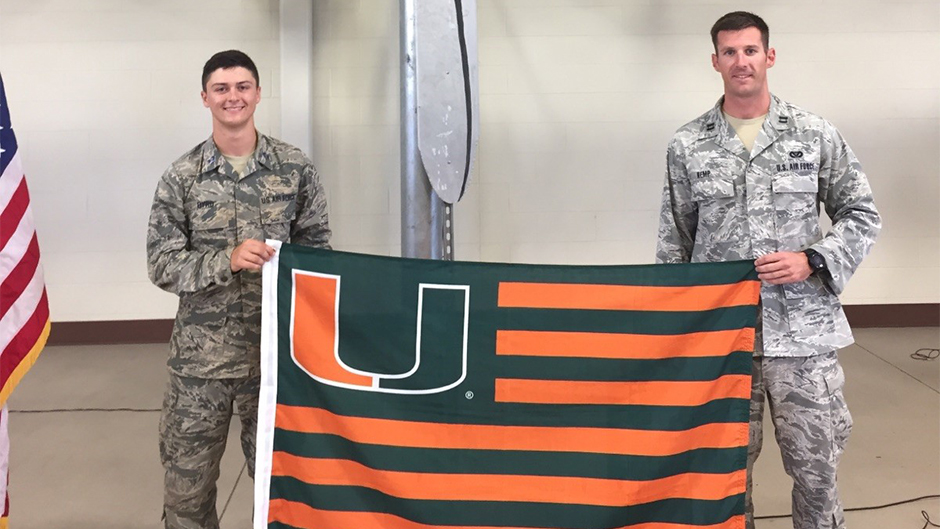Two members of the University of Miami Air Force Reserve Officer Training Corps (AFROTC) Detachment 155 received top honors at an annual summer training program called “LEAD” (Leadership, Evaluation and Development), which measures leadership skills while participating in real-life “simulation” exercises.
Captain Michael Kemp, assistant professor of aerospace studies at UM, was chosen as the number one instructor (or cadre) among a national group of 28 for his skills in supervising and leading over 1,000 cadets in exercises that simulate real-world field conditions.
Cadet Cameron Byrd, a UM junior at the College of Engineering, won the top spot among 334 cadets for work over 20 days at Maxwell Air Force Base in Montgomery, Ala., and Camp Shelby Joint Forces Training Center in Hattiesburg, Miss.
“It is quite an achievement for them because this is a very competitive process,” said Captain Alexander Rojas, assistant professor of aerospace studies and leader of the Air Force Reserve Officer Training Corps at UM.
The LEAD training, which cadets participate in the summer prior to their junior year, provides real-life experience. The cadets are thrust into an environment similar to a battleground. Their 15-hour days include small- arms training, endurance training, small-unit tactics, as well as self-aid buddy care, where individuals learn to take care of their wounds in case they are hurt and alone.
“We start evaluating their mental fortitude,” said Kemp. “What if you are in a convoy situation and the first vehicle gets hit by a mine. What do you do? What if you get shot and you are alone. What do you do?”
The goal is to determine if each cadet can still lead others while under tremendous stress, said Kemp.
Cadet Byrd, who hopes to be a fighter pilot, came through with flying colors. His mission was to lead his platoon in capturing a “terrorist” who along with other rebels had been taking over small towns in a mythical country named “Qirac.”
Byrd led a “wing,” or an organization of 334 cadets, through an urban environment—using walkie-talkies to communicate and relying on the advice of cadets who were sensitive to the country’s culture. It took them eight long, grueling hours, but they “captured” the terrorist.
“It was very challenging, but also rewarding,” said Byrd. “I had to coordinate movement of all 334 cadets, as well as delegate duties and make sure that all understood their responsibilities.”
Leadership is the cornerstone of the ROTC college program, which prepares students to become officers in the U.S. military, and is offered at colleges and universities across the United States.
The UM-based ROTC trains students to join the U.S. Air Force as commissioned officers. The four-year program, which currently has around 75 cadets, includes 20 from UM; the program also draws students from other nearby colleges and universities, Rojas said.
UM students who wish to join the ROTC for the U.S. Army Corps train at Florida International University.
For more information about the UM AFROTC program, visit http://www.as.miami.edu/airforcerotc/.

